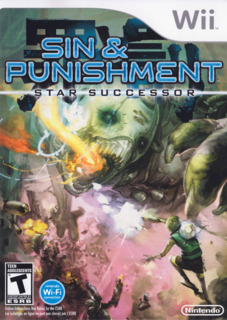or How I Learned To Stop Worrying And Love The Rail Shooter
Star Successor uses fairly basic technology - with occasionally blurry textures and simple polygons - to whip out of the scrappy hardware underdog one of the most awe inspiring, sensation crushing on-rails experiences any console has dared to hope for, with hundreds of enemies pouring out of every orifice, explosions dotting the horizon and a pace that few games can match. For a rail shooter, the four hours (without dying) that Treasure slapped onto a Wii disc with stunning bravado is filled with incredibly varied environments, dozens of enemy types, and rail shooter mechanics few would associate as the creation of anything but gods of their craft. For fans of the genre, this is heaven; for the rest of us, this is our doorway to enter a world unknown (and certainly louder than most).
The few seams that show in the fabric are minor and unadorned. The plot expresses itself as a conundrum of silly cutscenes - awful voice acting and low polygon actors abound - which, rather than affect the package's quality, sets the mood as the goofy arcade thrill-ride experience the game obviously aspires to be. While the graphics may momentarily impress, with a few bosses that look detailed enough to be hosted on more powerful hardware and fantastic environment design, there are also scenes with drab decoration and some camera angles that elicit spots of embarrassment. But both of these flaws easily fly out the window in the face of what Treasure was attempting to do - this is a pure game, without garnish or sophistication, but rather chain-linked explosions and high score tables.
Each of the game's intricate levels is crafted to flow impreceptibly from one set of encounters to the next, paying attention to the crescendos and denouements as necessary for the player's shell-shocked senses and coping mechanisms. Like the genre's musical genius, the well-known Rez, the experience clips along like a well paced song, shifting its focus here or there but always with a single eye on the bigger picture of the work. Sin and Punishment's mechanics are as strong as any other in the genre (the game's squirrelly controls help the player deal with the seemingly infinite bullet hell), and if there's anything that is particularly safe to say about the game as a whole, it's that it never gets boring. The smooth animation and sixty frames-per-second frame rate only compound just how solid the game feels once the player holds the remote in their hands.
With the broad strokes and deft tests of skill comes a well organized difficulty setting (of which even Easy won't be a cakewalk - but its manageable), online high-score lists, unlocked but minor variances of the campaign, and most of all, the soundtrack. Few accolades will communicate the energy and delight the music sets into the experience, but it is surely another aspect of what is undeniably one of the greatest rail shooters, if not one of the greatest games of this generation. It's a pity the game didn't do well on store shelves, but it does mean the game can be found for less than twenty dollars. This is an unbelievably good price for an unknown, forgotten gem in a sea of - in comparison to what we see here - mediocrity and unoriginality. Do not let this game pass you by.

